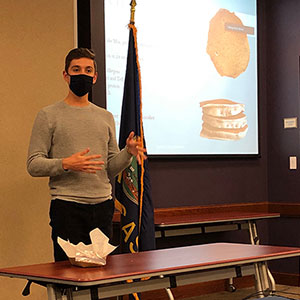February 15, 2021
Student-Driven Project Leads to New Foods from Sorghum, Wheat

Kansas State University senior Christy Vavra has a pretty easy way to let her friends and classmates know what she’s been doing in her food science classes recently.
Take them to breakfast.
Vavra is one of 17 students who recently developed novel foods as part of a partnership between K-State’s Department of Grain Science and Industry, the Center for Sorghum Improvement and the Kansas Department of Agriculture.
The groups have been exploring possibilities for using grain sorghum and wheat in developing new food products. The KDA has provided funds through the USDA’s Agricultural Marketing Service’s Federal State Marketing Improvement Program, as well as mentoring and marketing support.
Kerry Wefald, marketing director for the KDA, said sorghum and wheat were chosen because of their abundance in Kansas. In 2019, she notes, both crops ranked No. 1 in U.S. production. “We are always working to secure ways to promote our agricultural commodities,” Wefald said, “and both of these sectors have indicated an interest in diversifying markets.”
Vavra and classmate Emmalee Gragg led work in developing a gluten-free breakfast waffle sandwich – made from sorghum -- that was selected as a product to be served in K-State’s Kramer dining hall.
Developing the sandwich “was much more interesting for us knowing that there was already an end-user out there instead of developing a product and hoping to get it into the stores,” Vavra said.
Food science associate professor Kelly Getty said the students in her class, Research and Development of Food Products, were given a challenge at the beginning of the Fall, 2020 semester to create a baked item that had wheat or sorghum as its primary ingredient.
The students chose their class projects from one of four categories: a baked food for students at the university recreation center; a par baked bun; a product for child nutrition; or, according to Getty, “something out of the box.”
“As a group, we voted on ideas to pursue and in the end there were 13 products that are in one of the product development phases – concept to an actual food item,” she said.
Nine products are being scaled up and will be served to students in Kramer dining hall. In addition to Vavra’s waffle sandwich, some of the products offered include a tomato basil bun, gluten-free pancake mix and a vegetable cracker for kids.
Each product received many rounds of testing and feedback from students, professors, KDA staff and others. Kelly Whitehair, the menu and recipe development coordinator for K-State’s Housing and Dining Services, also was a key contributor.
Sarah Sexton Bowser, the managing director of the Center for Sorghum Improvement at K-State, said testing the products with college students was an important part of the process.
“College students are still in a formative stage in determining their own preferences and food experiences,” she said. “This project is an opportunity to showcase Kansas grains and commodities in their menus and on their pallets during the formative years.”
The project is in the first of three years to develop sorghum- and wheat-based foods. K-State assistant professor of cereal chemistry Yonghui Li is conducting research to develop technologies that will extract phenolic compounds from some specialty sorghums.
“The sorghum extracts interact with gluten proteins and starch when mixed with wheat flour and water during dough development,” Li said. “This will be useful for improving low-protein wheat flour when a stronger dough is more desired.”
Getty said K-State students in the 2021 fall class will focus on grain-based entrees, and the following year’s class will take on snack products.
The groups are now working to add the new food choices in the dining centers at other Kansas Board of Regent schools. Officials in the food service program at the University of Kansas already are on board.
“We are just pleased to partner and have the innovation of the next generation of food scientists working with sorghum and wheat to develop food items that their generation will most likely embrace and purchase in the grocery store, or out in the restaurant and retail markets,” Wefald said.
Sexton Bowser added: “It’s been a great project to see these individual entities and persons come together, contribute feedback from their vantage point and provide an end product that is allowing us to shape the student experience and create markets for Kansas grains.”
Vavra, who will graduate this May, figures the experience has given her a head start in her career.
“It was the highlight of my semester,” she said. “We had such ownership in what we were doing because it does matter.”